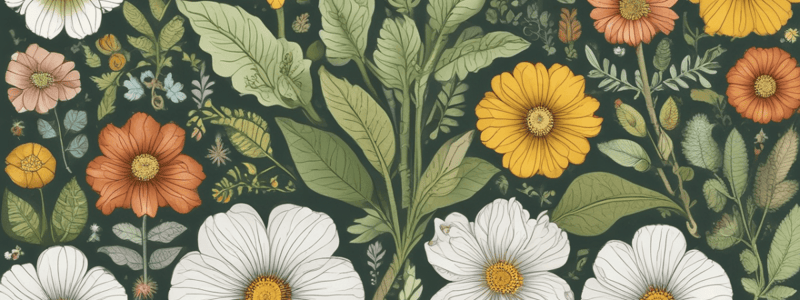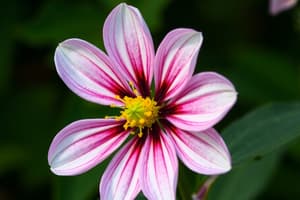Podcast
Questions and Answers
What is the role of the petals in most flowers?
What is the role of the petals in most flowers?
- To hold the flower to the shoot
- To produce seeds
- To attract insects for pollination (correct)
- To protect the flower in bud stage
What structure attaches the flower to the shoot?
What structure attaches the flower to the shoot?
- Pedicel (correct)
- Thalamus
- Sepal
- Style
What is the swollen upper end of the pedicel called?
What is the swollen upper end of the pedicel called?
- Thalamus (correct)
- Filament
- Style
- Ovary
Which part of a flower develops from the floral bud and is responsible for sexual reproduction?
Which part of a flower develops from the floral bud and is responsible for sexual reproduction?
Which floral part is involved in enclosing and protecting the inner whorls of a flower in bud stage?
Which floral part is involved in enclosing and protecting the inner whorls of a flower in bud stage?
Which of the following is part of the pistil?
Which of the following is part of the pistil?
What is another name for bisexual flowers?
What is another name for bisexual flowers?
Which of the following is an example of an incomplete flower?
Which of the following is an example of an incomplete flower?
What type of plant has male and female flowers on separate plants?
What type of plant has male and female flowers on separate plants?
Which of the following functions is NOT a primary function of flowers?
Which of the following functions is NOT a primary function of flowers?
Which plant is an example of a monoecious plant?
Which plant is an example of a monoecious plant?
What is the largest flower found in nature?
What is the largest flower found in nature?
Which whorl is missing in an incomplete flower?
Which whorl is missing in an incomplete flower?
What is the very first step in studying the structure of an ovary?
What is the very first step in studying the structure of an ovary?
When observing an ovary cut widthwise, which of the following should be noted?
When observing an ovary cut widthwise, which of the following should be noted?
What is the term for a group or cluster of flowers on a twig?
What is the term for a group or cluster of flowers on a twig?
Which of the following actions is not part of the procedure to study different flowers and their parts?
Which of the following actions is not part of the procedure to study different flowers and their parts?
How many ovules are found in each chamber of the Hibiscus flower's ovary?
How many ovules are found in each chamber of the Hibiscus flower's ovary?
What tool is recommended to study the detailed structure of the ovary?
What tool is recommended to study the detailed structure of the ovary?
Which part of the flower is NOT removed when preparing to study the ovary?
Which part of the flower is NOT removed when preparing to study the ovary?
In the context of the activities described, what is a whorl in a flower?
In the context of the activities described, what is a whorl in a flower?
Which flower is mentioned specifically in Activity 3 as having five chambers in its ovary?
Which flower is mentioned specifically in Activity 3 as having five chambers in its ovary?
Which of the following steps involves the actual transfer of pollen grains?
Which of the following steps involves the actual transfer of pollen grains?
What is pollination by wind referred to as?
What is pollination by wind referred to as?
Which plant is NOT typically pollinated by wind?
Which plant is NOT typically pollinated by wind?
Which term describes the transfer of pollen grains from the anther of one flower to the stigma of another flower on the same plant?
Which term describes the transfer of pollen grains from the anther of one flower to the stigma of another flower on the same plant?
What is the primary role of pollinators in the pollination process?
What is the primary role of pollinators in the pollination process?
Cross-pollination involves which of the following?
Cross-pollination involves which of the following?
Which characteristic is NOT associated with wind-pollinated flowers?
Which characteristic is NOT associated with wind-pollinated flowers?
Which plant is an example of a water-pollinated flower?
Which plant is an example of a water-pollinated flower?
What needs to happen for pollination to occur in Vallisneria?
What needs to happen for pollination to occur in Vallisneria?
Which characteristic is NOT true for water-pollinated flowers?
Which characteristic is NOT true for water-pollinated flowers?
Which of the following flowers are pollinated by insects?
Which of the following flowers are pollinated by insects?
What is a common misconception about insect pollination?
What is a common misconception about insect pollination?
Why do pollen grains stick to the body parts of insects during insect pollination?
Why do pollen grains stick to the body parts of insects during insect pollination?
Which of the following is NOT a feature of wind-pollinated flowers?
Which of the following is NOT a feature of wind-pollinated flowers?
What is the main function of the stigma in the gynoecium?
What is the main function of the stigma in the gynoecium?
What is formed in the pollen sacs of an anther?
What is formed in the pollen sacs of an anther?
Where are female gametes found in the pistil?
Where are female gametes found in the pistil?
Into what does the ovary mature after fertilisation?
Into what does the ovary mature after fertilisation?
Which part of the pistil does the pollen tube grow through?
Which part of the pistil does the pollen tube grow through?
Which parts of a flower are referred to as essential whorls?
Which parts of a flower are referred to as essential whorls?
Which of the following is NOT a part of the stamens in the androecium?
Which of the following is NOT a part of the stamens in the androecium?
What is the primary role of calyx and corolla in a flower?
What is the primary role of calyx and corolla in a flower?
Flashcards are hidden until you start studying
Study Notes
Types of Flowers
- Flowers can be classified into two types based on the presence of male and female reproductive parts:
- Bisexual Flowers: Have both male and female reproductive parts (stamens and pistil). Examples: China rose, Mustard, Pea, Gram, Petunia, Rose, etc.
- Unisexual Flowers: Have either male reproductive part (stamens) or female reproductive part (pistil). Examples: Cucumber, Pumpkin, Papaya, Maize, Coconut, etc.
Classification of Flowers Based on the Presence of Floral Whorls
- Flowers can be classified into two types based on the presence of floral whorls:
- Complete Flowers: Have all four whorls (sepals, petals, stamens, and pistils). Examples: China rose, Petunia, Mustard, Pea, etc.
- Incomplete Flowers: Have one or more whorls missing. Examples: Mulberry, Pumpkin, Papaya, etc.
Functions of a Flower
- The main functions of a flower are:
- Reproduction: Produces male and female gametes.
- Ornamental Value: Used for decoration.
- Source of Food: Develops into fruit and seeds, which grow into new plants.
- Religious Significance: Used for worship and making garlands.
More About Flowers
- Dioecious Plants: Plants bearing male flowers in one plant and female flowers in another plant. Example: Papaya.
- Monoecious Plants: Plants bearing male and female flowers on the same plant. Examples: Maize, Coconut.
- A single flower on a twig is called a Solitary Flower.
- A group of flowers borne on a twig or branch forms an Inflorescence.
- The twig holding the whole inflorescence is called a Peduncle.
Interesting Facts About Flowers
- Nectar of Flowers: Collected by honeybees to prepare honey.
- Cloves: Dried floral buds used for flavoring food and as a medicine.
- Smallest Flowers: Belong to the Duckweed plant (Wolffia), measuring about 0.5 mm in diameter.
- Largest Flower: Rafflesia, found in Indonesia, measuring about 1 meter in diameter.
Structure of a Flower
- Thalamus: The upper swollen end of the pedicel.
- Pedicel: The stalk that attaches the flower to the shoot.
Parts of a Flower
- Calyx: The outermost whorl, formed of tiny green, leaf-like structures called sepals.
- Corolla: The second whorl, formed of petals.
- Androecium: The third whorl, formed of stamens.
- Gynoecium: The fourth whorl, formed of a single flask-shaped structure called a pistil.
Pollination
- Wind Pollination: The transfer of pollen grains from anther to stigma of flower by wind.
- Water Pollination: The transfer of pollen grains from anther to stigma of flower by water.
- Insect Pollination: The transfer of pollen grains from anther to stigma of flower by insects.
Mechanism of Sexual Reproduction in Plants
- Pollination: The transfer of pollen grains from anther to stigma of flower.
- Fertilisation: The fusion of male and female gametes to form a zygote.
- Dispersal of Fruits and Seeds: The spreading of seeds away from the parent plant.
- Seed Germination: The growth of a new plant from a seed.
- Formation of Fruits and Seeds: The development of seeds and fruits from the ovary of a flower.
Studying That Suits You
Use AI to generate personalized quizzes and flashcards to suit your learning preferences.




